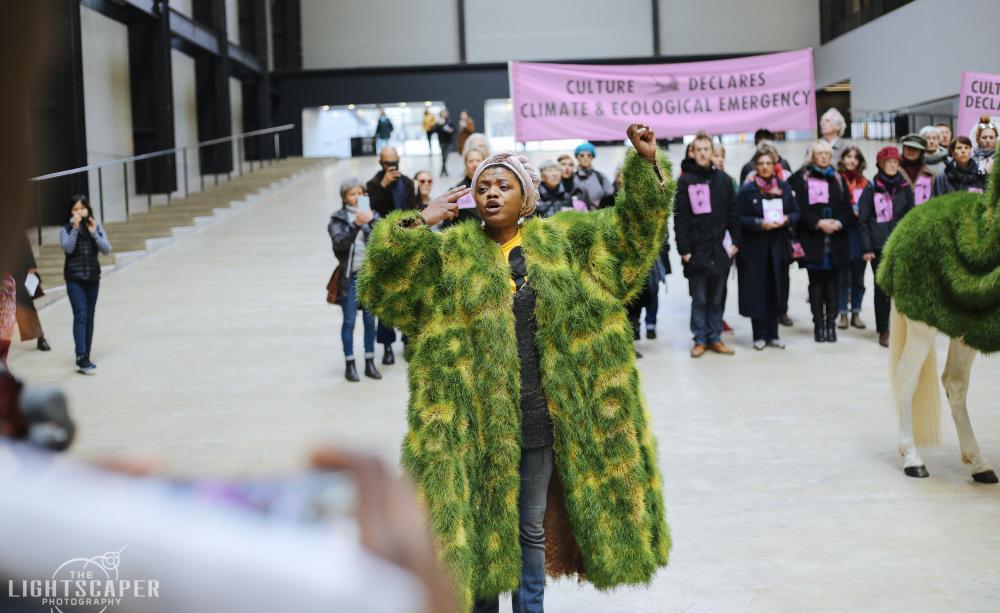0
It’s all go in adland this week. Following Extinction Rebellion’s open letter to the industry a few weeks back, written by XR members with decades of experience in the ‘power of persuasion’, the agency world of smart-thinking, super-savvy spinmeisters is starting to respond to the thrown-down gauntlet.
The XR letter pulled few punches: “Advertising will increasingly be seen alongside oil and logging as obviously toxic industries and those with the job title ‘creatives’ will soon find themselves rebranded as ‘destroyers’.” Ouch.
They went on to demand that companies: “Declare a climate and ecological emergency and act accordingly”. Everybody’s doing it after all, in fact it’s quite ‘on trend’. Ask Greta. It’s time to panic. Today, it is reported that consumers are set to spend £800 million on 10 million wedding outfits they will wear once.
Carbon disclosure
In light of this challenge the launch of the Creative Climate Disclosure Project is a welcome initiative.
Acknowledging that "creativity has consequences", that the industry "cannot be neutral" and that there is a real choice to "inspire change or keep serving destruction", the project seeks to echo the hugely ambitious, influential and successful global Carbon Disclosure Project (CDP).
This initiative has transformed our understanding of where carbon intensity, responsibility, risk and opportunity lies in the global corporate world. In the same way that enlightened investors use CDP data to potentially divest their portfolios from climate destruction and hold companies to account, the Creative Climate Disclosure Project (CCDP – sorry about the acronyms!) calls for agencies to ‘divest’ their creative services away from ‘those most answerable for causing the climate emergency’. This is all highly laudable.
So who are those "most answerable"? Well, this is where it gets complicated. The CCDP is essentially calling for agency transparency around how much money they make or take from these problematic "high carbon" industry clients (as defined by the IEA and EPA). These include all the usual suspects: fossil fuels, aviation, trucks, cars and shipping, timber, steel and plastics and meat and dairy.
At the extreme end of accountability the CDP’s (bear with me here!) ‘Carbon Majors Report’ highlighted that just 100 companies are responsible for 71 percent of carbon emissions since 1988. So ‘Divest’ away from those and you and your agency can join the rebellion right? Wrong.
Carbon inequality
Don't get me wrong - It's a good thing to avoid working directly for those badboy businesses driving us towards the brink of climatic and ecological Armageddon, of which the fossil fuel majors are just the most obvious.
Taking their dirty dollars should be a source of real shame, but that’s not something we’re likely to see a lot of from BP’s agency WPP.
The awesome ‘Liberate Tate’ movement has pioneered campaigns to get fossil fuel money out of the arts sponsorship world, and ‘Culture Declares Emergency’ has now followed. Plus an ever growing bunch of activist artists, including Oscar winning actor Mark Rylance who recently quit the Royal Shakespeare Company over BP’s funding of it, are also stepping up.
These creative boycotts and ingenious lobbying tactics work. Refuting these businesses public licence to operate, for which their arts funding provides a foundation, is one thing. As is ‘divesting’ your agency from high carbon industry clients. But is it enough?
The answer is no. The world has what Oxfam describes as ‘Extreme Carbon Inequality’ with the richest 10 percent of the world’s population in developed countries responsible for 50 percent of global carbon emissions.
Climate science
Our real challenge is about consumption not population. Whilst the number of humans on the planet also matters, it’s how we all live that really counts.
Generally, the richer we are, the more we consume, the bigger our carbon footprint. It’s a fairly consistent linear relationship. And even amongst the self-proclaimed ‘environmentally-enlightened’ individual impacts are higher than the average, and rise with rising income!
And this is where, forgive the metaphor, the rubber really hits the road for the creative industries. They’re there to sell. And sell more. Simples. ‘Ah yes, but we can sell the good stuff!’ will say the ethical agencies, ‘we can tell the better stories and sell the more sustainable choices to keep us all on the right side of history and save the world’.
However as the CCDP itself states "agencies must be aligned with the climate science, just like everyone else". And this is where it gets really tricky…
Without going into the dangerously seductive notion of ‘techno-optimism’ in massive depth here (I’ll leave that to this excellent paper on ‘Prosperous Descent’ by Samuel Alexander), it is now abundantly clear that increases in efficiency of resource use in a continuous economic growth paradigm, and any progress from the relative decoupling of resource use from economic activity, are almost always undermined by rebound effects – direct, indirect and macroeconomic. As per Jevon’s paradox– increased efficiency of use usually increases overall consumption.
Economic growth
In short so called ‘sustainable growth’ will kill us, because in our existing economic paradigm, mindset and behaviours, efficiency will always be *coughs* ‘Trumped’ by growth.
Overall economic growth wipes out our savings. And this is why the desire industry needs to confront it’s own CGI, VR, augmented interaction, day-glo pachyderm in the room. Extinction Rebellion exploded into the public consciousness on the back of imploring that we all "Tell the truth and act like that truth is real".
What does that truth look like for the advertising world? As XR puts it: “One of the reasons we’ve got here is because you’ve been selling things to people that they don’t need. You are the manipulators and architects of that consumerist frenzy.”
Agency reality is currently an ‘at-all-costs’ growth model and a client-service cage of incrementalism on supposed ‘sustainability’.
Marketing budgets exist to boost sales, turnover, deliver growth and profit. Clients don’t brief-in radicalism because they’re often doing very well out of the status quo thank-you-very-much-so-why-change?
That leaves even the most courageous agencies trying to unpick a Gordian Knot - How far to try to push a client’s sustainability ambitions when there are a myriad other equally clever creative competitors out there, who can outgun, out-resource and out-maneuvre you just by being the more ‘realistic’ or ‘less risky’ option for the even vaguely cautious client.
If not quite a race to the bottom, this is at least a constant and ongoing competitive dilution of more radical possibilities.
This is not a Drill
And after almost two decades in the business I don’t see it changing anywhere near fast enough. Sure we’ve made some great in-roads, perhaps almost proven by the ham-fisted cynical and disingenuous attempts by cynical creatives to hijack genuine concerns, issues and even values by greenwashing, pinkwashing and purposewashing in order to flog more stuff.
But we’re all still basing our work, our value, our very client promise on ‘more’, when everything about our shared challenges is screaming ‘less’.
Climate activist Alex Steffen warns that "winning slowly is the same as losing". And we’re not even winning slowly at the moment, we’re just slowing the pace at which we’re losing.
This is why XR’s letter isn’t a ‘nudge’. It’s a seismic shock, an electrical jolt, it’s a rocket up where the sun don’t shine. If what needs to be done doesn’t fit within existing commercial realities – then we must change those realities. Fast. Anything else is delusional.
Because this is an emergency. Now eleven years and counting until we deliver (at least) a 40 percent reduction in carbon. And an urgency on biodiversity loss which is even sharper. Every month matters. Every quarter counts. This is not a drill.
Brave or dead
I’m not going to go so far as Bill Hicks went 25 years ago and suggest anyone who works in advertising and marketing should ‘kill themselves’. Although he was right on one point – this industry has merrily spent the last quarter of a century making things a lot lot worse.
The advertising industry and their clients both need to stand up and be counted right now in a far more soulful and systemic fashion. This is not just about who your clients are and how you pay your bills. This is not just about avoiding high carbon sectors.
This is about the very beast we are all feeding – overconsumption. That is the planet-eating monster we all serve whilst we virtue-signal our way to oblivion. We’re fanning the flames of disaster. The first thing we should do is switch off the fan.
The CCDP’s failure to grasp this, or even mention it, completely and utterly misses and misrepresents the spirit of XR.
The US marketing guru Seth Godin famously said: "There are increasingly only two kinds of company; brave or dead". Brave agencies must step up in a way that none has done in the last two decades, but just telling us you’re not working with the ‘nasty’ clients ain’t enough. As consultants ping around the world on millions of flights to advise clients we need to think far more creatively on how we live the change required.
Burning questions
Perhaps agencies need to relocalise? Only serving or accepting clients they don’t have to fly to? Maybe we need further gatekeeper criteria for client selection? Is the client committed to science based targets? Or Fair tax payments (corporate tax avoidance hobbles Government’s ability to address the climate emergency)?
These are the burning questions because we are in totally unchartered territory here, business as usual is not an option, it’s a collective death sentence.
In their letter XR sardonically used the greatest of the advertising industry’s ‘hits’ back at them: Just Do It. Be All You Can Be. Impossible Is Nothing (or ‘shoes’, ‘army’, ‘shoes’ as they say in the studio). Or as David Attenborough put it recently ‘We cannot be radical enough’.
Above all else what has driven XR is connection. A softly sublime and even spiritual reconnection with nature and one another and the often terrifying reality in which we find ourselves. An ability to recognize the grief so many of us feel at the unwravelling of the web of life around us, and in our lifetimes on our watch, and the unbearable suffering for people and wildlife that results.
We embrace XR to escape the nightmares created by advertising’s hollow dreams. XR’s collective emotional and emergent power stands in stark contrast to the psychological individual manipulation of the advertising industry.
Creative rebelling
What we really need and value and what genuinely makes us happy and gives us meaning in life is not material. It’s social, emotional and environmental. It’s not another slickly packaged and promoted product or service. We are already everything we need. And for the advertising world that is an inconvenient truth.
XR and advertising are two wildly different worlds colliding. This will not be comfortable for anyone, and the CCDP is a good first step.
But we’re kidding ourselves if we think it is anything but the most basic of baby steps. A toddler when we need adults in the room immediately. To change everything we need everyone doing all they can. We need every concerned creative rebelling with all their heart and soul like all our lives depended on it*.
*spoiler alert: they do
This Author
Ed Gillespie is the author ‘Only Planet’. Follow him on Twitter , LinkedIn , Facebook and Instagram.
Image: Tomm Morton.







